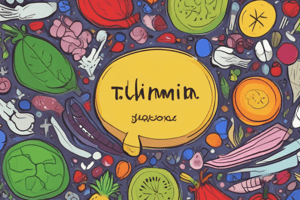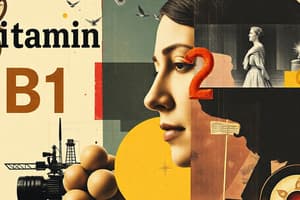Podcast
Questions and Answers
Which of these vitamins are water-soluble?
Which of these vitamins are water-soluble?
- Vitamin B12
- Vitamin B9 (correct)
- Vitamin B3 (correct)
- Vitamin B5 (correct)
- Vitamin A
- Vitamin B6 (correct)
- Vitamin B2 (correct)
- Vitamin B1 (correct)
- Vitamin B7 (correct)
A deficiency in Vitamin B1 can cause a condition known as beriberi.
A deficiency in Vitamin B1 can cause a condition known as beriberi.
True (A)
What is the primary function of Vitamin B2?
What is the primary function of Vitamin B2?
Vitamin B2 (Riboflavin) assists in the conversion of food into energy and maintains blood health.
A deficiency in Vitamin B3 can lead to a condition called ______ which is characterized by symptoms like diarrhea, dermatitis, dementia, and even death.
A deficiency in Vitamin B3 can lead to a condition called ______ which is characterized by symptoms like diarrhea, dermatitis, dementia, and even death.
Match the following vitamins with their primary functions:
Match the following vitamins with their primary functions:
Which of these foods is NOT a good source of Vitamin B12?
Which of these foods is NOT a good source of Vitamin B12?
Consuming raw egg whites can lead to a deficiency in Vitamin B7 (Biotin).
Consuming raw egg whites can lead to a deficiency in Vitamin B7 (Biotin).
Why is folate (vitamin B9) often recommended for pregnant women?
Why is folate (vitamin B9) often recommended for pregnant women?
What condition can result from a deficiency of Vitamin C?
What condition can result from a deficiency of Vitamin C?
Vitamin D can be produced through exposure to sunlight.
Vitamin D can be produced through exposure to sunlight.
Name one food source that is rich in Vitamin K.
Name one food source that is rich in Vitamin K.
Vitamin E is primarily sourced from ______ and seed oils.
Vitamin E is primarily sourced from ______ and seed oils.
Match the vitamin with its associated function or deficiency condition:
Match the vitamin with its associated function or deficiency condition:
Flashcards
Vitamin C
Vitamin C
An antioxidant found in fruits and vegetables, helps combat free radicals.
Vitamin D
Vitamin D
Regulates mood and aids calcium/phosphorus absorption; deficiency causes rickets.
Vitamin E
Vitamin E
Protects other nutrients and prevents Alzheimer's; deficiency can cause weakness.
Vitamin K
Vitamin K
Signup and view all the flashcards
Vitamin Deficiency Symptoms
Vitamin Deficiency Symptoms
Signup and view all the flashcards
Vitamin B1 (Thiamine)
Vitamin B1 (Thiamine)
Signup and view all the flashcards
Dry Beriberi
Dry Beriberi
Signup and view all the flashcards
Wet Beriberi
Wet Beriberi
Signup and view all the flashcards
Vitamin B2 (Riboflavin)
Vitamin B2 (Riboflavin)
Signup and view all the flashcards
Vitamin B3 (Niacin)
Vitamin B3 (Niacin)
Signup and view all the flashcards
Vitamin B6 (Pyridoxine)
Vitamin B6 (Pyridoxine)
Signup and view all the flashcards
Vitamin B12 (Cobalamin)
Vitamin B12 (Cobalamin)
Signup and view all the flashcards
Study Notes
Vitamin A
- Plays a crucial role in maintaining healthy eyes, promoting bone and tooth growth, and regulating genes.
- Deficiency, uncommon in developed countries, can cause night blindness, bone problems, and infections due to a weakened immune system.
- Found in egg yolks, liver oil, meat, cheese, and butter.
Vitamin B1 (Thiamine)
- Essential for converting food into energy, maintaining healthy skin, and supporting a healthy nervous system.
- Deficiency, known as beriberi, can be dry or wet.
- Dry beriberi causes neuropathy due to nerve damage.
- Wet beriberi causes dilated cardiomyopathy, leading to enlarged and weakened heart chambers, potentially resulting in heart failure.
- Water-soluble, meaning excess amounts are eliminated through urine.
- Found in eggs, meat, yeast, vegetables, and nuts.
Vitamin B2 (Riboflavin)
- Assists in converting food to energy and maintains blood health.
- Water-soluble.
- Deficiency usually results from malnutrition or a lack of dairy and meat, particularly in those with lactose intolerance.
- Found in milk, whole grains, eggs, yeast, mushrooms, and leafy green vegetables.
Vitamin B3 (Niacin)
- Functions similarly to vitamins B1 and B2.
- Deficiency leads to pellagra, characterized by diarrhea, dermatitis, dementia, and potentially death.
Vitamin B5 (Pantothenic Acid)
- Aids in the production of lipids, neurotransmitters, steroid hormones (like testosterone and progesterone), and hemoglobin (a protein in red blood cells).
- Found in chicken, broccoli, avocados, and tomatoes.
Vitamin B6 (Pyridoxine)
- Regulates amino acids, impacting sleep, appetite, and mood.
- Helps create red blood cells.
- Found in fish, legumes, potatoes, and bananas.
Vitamin B7 (Biotin)
- Helps synthesize glucose, break down fatty acids, and maintain healthy bones and hair.
- Deficiency is rare but can occur due to consuming raw egg whites (avidin inhibits absorption).
- Widely found in various foods.
Vitamin B9 (Folate)
- Important for cell creation.
- Often taken by pregnant women to promote fetal brain health.
- Found in asparagus, okra, spinach, and orange juice.
Vitamin B12 (Cobalamin)
- Crucial for DNA synthesis and the metabolism of fatty acids and amino acids.
- Deficiency causes megaloblastic anemia, resulting in large, ineffective red blood cells.
- Symptoms include walking difficulties, numbness/tingling in hands/feet, and fatigue.
- Found in meat-based products.
Vitamin C (Ascorbic Acid)
- Found only in fruits and vegetables, especially citrus fruits.
- Acts as an antioxidant, neutralizing free radicals.
- Deficiency leads to scurvy, a disease marked by slow wound healing, easy bruising, tooth loss, gum disease, skin bleeding, and ultimately, death.
Vitamin D
- Regulates mood and aids in calcium and phosphorus absorption, crucial for strong bones and teeth.
- Deficiency causes osteomalacia (soft bones) in adults and rickets in children, leading to skeletal deformities.
- Infants were often given cod liver oil (vitamin D-rich) to prevent rickets.
- Produced through sunlight exposure.
Vitamin E (Tocopherol)
- Primarily found in fruits, seeds, and seed oils.
- Protects other nutrients, like vitamin A, and certain lipids from damage.
- Prevents Alzheimer's disease (note: the evidence for this is debated).
- Deficiency, although rare, can lead to impaired coordination, muscle weakness, and possibly paralysis.
- Vitamin E is crucial for red blood cell integrity, so deficiency can cause anemia.
Vitamin K
- Essential for blood clotting, activating proteins and calcium for this process.
- Produced by gut bacteria, also found in cabbage, liver, broccoli, and kale.
- Deficiency can result in excessive bleeding after injuries, osteoporosis, and increased cardiovascular risk.
Studying That Suits You
Use AI to generate personalized quizzes and flashcards to suit your learning preferences.




